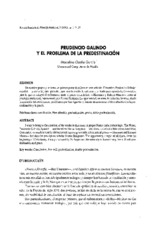Mostrar el registro sencillo del ítem
Prudencio Galindo y el problema de la predestinación
| dc.contributor.author | Ocaña García, Marcelino | |
| dc.date.accessioned | 2021-11-19T11:18:01Z | |
| dc.date.available | 2021-11-19T11:18:01Z | |
| dc.date.issued | 1998 | |
| dc.identifier.issn | 1133-0902 | |
| dc.identifier.issn | 2530-7878 | |
| dc.identifier.uri | http://hdl.handle.net/10396/22145 | |
| dc.description.abstract | Un nombre propio y un tema, se quieren poner de relieve en este articulo. El nombre, Prudencio Galindo: español, -y como tal, casi ignorado-, que tuvo Ia osadía de defender a un fraile poco apreciado, Gotescalco, para lo que no rehuyó el enfrentarse, tanto a! poder eclesiástico, -Hincmaro y Rabano Mauro-, como al prestigio intelectual, representado por Escoto Eriúgena. La oportunidad, un tema de todos los tiempos, desde Ia aparición del cristianismo, ya debatido por San Agustín: el intento de armonizar el libre albedrío con Ia predestinación y Ia gracia. | es_ES |
| dc.description.abstract | I want to bring to the attention of the reader in this essay. A proper Name and a certain topic. The Name, Prudencio Galindo, Spanish -and therefore Almost forgotten- who dared to defend a little appreciated friar, Gotescalco, so much so that he did not avoid opposing not only eclessiastical power -Hincmaro and Rabano Mauro- but also the prestigious scholar Scotus Eringenus. The opportunity, a topic of all times, from the beginning of Christianity, already discussed by St. Augustine: the intention of harmonizing free will with predestination and grace. | es_ES |
| dc.format.mimetype | application/pdf | es_ES |
| dc.language.iso | spa | es_ES |
| dc.publisher | UCOPress | es_ES |
| dc.rights | https://creativecommons.org/licenses/by-nc-nd/4.0/ | es_ES |
| dc.source | Revista Española de Filosofía Medieval 5, 147-157 (1998) | es_ES |
| dc.subject | Libre albedrío | es_ES |
| dc.subject | Filosofía medieval | es_ES |
| dc.title | Prudencio Galindo y el problema de la predestinación | es_ES |
| dc.type | info:eu-repo/semantics/article | es_ES |
| dc.relation.publisherversion | https://www.uco.es/ucopress/ojs/index.php/refime/index | es_ES |
| dc.rights.accessRights | info:eu-repo/semantics/openAccess | es_ES |

